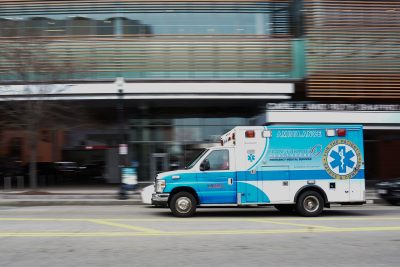As the number of coronavirus cases in Boston climbs higher, so does the number of donations to the Boston Resiliency Fund.
The fund, launched by the Mayor’s Office on March 16, has surpassed its $20 million goal less than 10 days after its launch, according to a City press release.

Comprised of donations from hundreds of individuals, organizations and philanthropic partners, the fund aims to meet the immediate needs of Boston residents and frontline workers during the COVID-19 crisis.
The initial goals of the fund are to ensure Boston residents’ access to food, support first responders and health care workers, and provide access to technology for Boston students moving to remote learning, according to the press release.
On March 27, the fund allocated $5.4 million in immediate grants to eight local organizations fighting the COVID-19 crisis in Boston, according to the press release. These organizations include food delivery and distribution operations, homeless shelters, as well as health care providers that are in dire need of assistance to meet increased demands.
Mayor Marty Walsh said in the press release that these grants would not be possible without the contributions of the more than 1,800 Boston residents and organizations.
“I am incredibly proud to see the generosity of the people and organizations of Boston who have come together during this time of crisis to support one another,” Walsh said. “These grants will allow the local organizations in our community to provide critical services and scale up their operations to meet the needs of Boston’s most vulnerable residents.”
Boston Health Care for the Homeless Program is one of the organizations receiving major grants from the fund. Vicki Ritterband, media coordinator for BHCHP, said in an email that the funds received will go to new coronavirus-related services and medical sites.
“BHCHP will be spending the funds we receive from the fund on new programming we have developed in response to the pandemic, which includes testing, isolation and quarantine services for homeless patients,” Ritterband wrote. “We’ll also be providing medical staffing to some of the new sites for homeless patients that have been set up across the city.”
Ritterband said some of the funds will go towards alleviating the financial strain put on BHCHP due to the cancellation of their regular medical procedures.
“Also, since we have greatly curtailed many of our regular medical services that are reimbursed by insurance, we are losing a lot of money each month,” Ritterband wrote, “so the Resiliency Fund disbursement will off-set some of those losses.”
Project Bread, a Massachusetts organization battling food insecurity, is another group on the list to receive a grant from the Boston Resiliency Fund, according to the press release. Erin McAleer, president of Project Bread, wrote in an email that COVID-19 has created an increase in food insecurity in Massachusetts.
“Project Bread is facing a surge in demand by the tens of thousands of individuals and families suddenly confronted with food insecurity as a symptom of the COVID-19 crisis,” McAleer wrote. “With schools closed, there are hundreds of thousands of kids without access to meals. Project Bread has been working with partners to set up meal sites statewide.”
McAleer wrote that Project Bread’s hotline, which connects callers with food resources, has received four times the normal volume of calls in recent weeks.
“Project Bread has made a massive and quick transition to a new reality,” McAleer wrote. “The nonprofit expects demand for Project Bread’s FoodSource Hotline to continue soaring, especially if the economy goes into recession.”
About Fresh, another food access organization affected by increased demand due to COVID-19, also received a grant from the Boston Resiliency Fund. Annika Morgan, co-founder of About Fresh, said that the funds received will go toward altering the method of distribution for its Fresh Truck program.
Morgan said the Fresh Truck mobile markets, which are made from retrofitted school buses, are not in compliance with the Center for Disease Control’s social distancing guidelines. With the help of a grant from the Boston Resiliency Fund, they have developed a new food delivery system.
“And in that work, we were awarded a grant from Boston Resiliency Fund,” Morgan said. “And the City in general has been a really phenomenal partner in that work with us.”
After suspending its mobile markets, Morgan said About Fresh has set up Fresh Truck Box, which delivers pre-packaged boxes of fresh food items to both large-scale residences and individuals’ doorsteps. The goal, Morgan said, is to create a safer and more cost-efficient solution.
“We are making all of the deliveries at no cost to the household,” Morgan added. “So that’s where the city of Boston funding is going, to cover the cost of the food that’s being delivered.”
The Boston Resiliency Fund will continue to accept donations. 100 percent of all collected funds will be awarded to local organizations.



























































































































